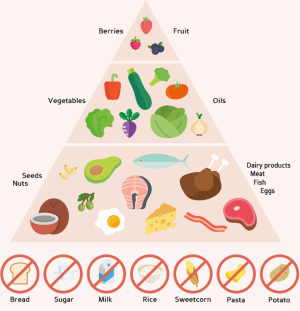
The Keto Diet is one of the most popular ‘fad’ diets that has been heavily promoted in recent years as a quick way to lose fat. The diet is promoted to everyone, this diet is only “realistically” do-able for young adults and older, but it is the idea encompassing the diet that makes it so appealing. Essentially the Keto Diet is most simply known for cutting out Carbohydrates from your diet to get your body's main source of burning energy from ketones, not glucose. Carbohydrates are broken down into sugars known primarily known as Glucose, your body's primary source of energy. In the Keto Diet, the consumption of very few carbs and more fat eliminates the body from burning glucose and instead burns ketones putting your body into a state of ketosis.
The original keto diet was designed by Dr. Russell Wilder in 1924 this diet was designed as a treatment for epilepsy. At the time nutrition wasn’t as widely studied or known about so at the time the creator of this diet provided what he perceived to be accurate information. Although now we know there may be some harmful health effects when consuming this diet. The diet was created for children who had epilepsy and initially was not to be used within the common population of individuals.
This diet is not one many will recommend; this is because carbs are important as they are your main fuel source. Would I recommend lowering carbs? Certainly, but not completely cutting them to the extent that the Keto Diet asks you too. I would lower carbs to about 45% at the most as this is the RDA. This diet should only be used for someone with a condition that a drastic diet change would be beneficial to that person or patient, such as epilepsy.
The Keto Diet is not necessarily a diet where you would decrease the number of calories you consume to lose weight but rather change the foods you are eating to change the way your body burns energy - thus leading to weight loss. The calories that you would normally consume through carbohydrates are minimized and taken over by more calories consumed through fats and the higher end of the protein. The diet is made up of about 30-35% protein while the recommended daily intake is 10-35%. This percentage from proteins, although higher than a person not following the keto diet may consume, is still in line with the recommended daily intake and does not exceed twice the amount.
The Keto Diet is more simply known as a low-carb, high-fat diet eliminating all types of carbs on the diet except for around 5-10% of total calories daily. Because of the low-carb aspect of the diet, it makes up for the high-fat consumption to turn your body's main source of burning energy from glucose to ketones. The amount of fat that makes up the keto diet is around 55-60% percent of total calories daily. While that provides enough fat for satiety, 55-60% is almost twice the recommended daily intake from fats in our diet. The amount of fat in the keto diet goes against current recommendations for good health.
The point of the Keto diet is to bring your body to ketosis, there is not enough carbohydrate provided to prevent ketosis. In a normal ketogenic diet, the macronutrients are divided as such to have 55-60% from fats, 30-35% from proteins, and only 5-10% from carbohydrates. This generally will leave people eating a 2000 calorie diet with about only 20-50 grams of carbohydrates per day. Different individuals partake in the diet differently, therefore the type of carbohydrates eaten is very dependent on the individual participating. Overall, when done “properly” it is the hope that complex carbohydrates are eaten much more than simple carbohydrates.
This diet cannot provide individuals with the proper vitamins and minerals that they require. There is a huge emphasis on lipids within the diet, therefore resulting in a lack of carbohydrates. Many vitamins and minerals can be found in fruits and vegetables, which are carbohydrates. Depending on how the individual chooses to eat their percentage of carbohydrates, they may be significantly lacking in micronutrients as which provide essential functions for your body. No single food group is omitted; however, vegetables, fruits, grains are all provided to a much lesser extent than they should be. For those participating in the diet, it would be wise to focus on the quality of the carbohydrate choices and possibly begin taking vitamins. Other health effects of the keto diet can be hypoglycemia, fatigue, hunger, confusion, tachycardia, and even light headiness. Long-term effects can be kidney stones, bone fractures, and increased cholesterol. Using carbs as your primary food source is important as that’s how your body has adapted to survive. Yes, a lot of simple carbs will increase your fat, but whole complex carbohydrates such as oatmeal are very healthy and important.
Contact us at Genesis Personal Fitness for more information on keto diets & other nutrition and health needs!

